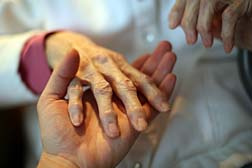LAWSUITS NEWS & LEGAL INFORMATION
Elder Care Lawsuits & Senior Legal Help
Long-term elder care is on the rise, mainly because Americans are living longer and the first wave of baby boomers has now reached retirement age. As a result, not only are more seniors than ever utilizing long-term care insurance and assisted living facilities, many are also choosing to live independently. But longevity and an increasing elder population can create many challenges--some of which can lead to elder care lawsuits. Senior legal concerns can include nursing home abuse, senior scams, bad faith long term care insurance, nursing home neglect, and financial elder abuse.
FREE CASE EVALUATION
Send your elder care claim to a Lawyer who will review your claim at NO COST or obligation.
Get Legal Help Now
Get Legal Help Now
When Seniors Need Legal Help
While getting older no longer necessarily carries images of frailty or dependency, many seniors do at some point require full-time health care assistance and/or help with financial matters--either from a financial planner or, more often, a loved one. In all cases, trust is of utmost importance but unfortunately, not all caregivers are completely trustworthy--even, for example, when Power of Attorney is granted to next-of-kin. Elder care attorneys note that seniors who have put their faith in those they have chosen to help guide their financial and healthcare decisions may then be embarrassed to question the caregiver's actions, motives or integrity. Sometimes aging parents may not want to cause a riff in the family or ever think that a child of theirs or a trusted friend could possibly betray their best interests. But this is exactly when elder care legal help may be necessary-- perhaps even an elder care lawsuit. And, it's the children of aging parents who will need to bring forward a legal complaint--they will need to be their parent's advocate.
Elder care attorneys note that seniors who have put their faith in those they have chosen to help guide their financial and healthcare decisions may then be embarrassed to question the caregiver's actions, motives or integrity. Sometimes aging parents may not want to cause a riff in the family or ever think that a child of theirs or a trusted friend could possibly betray their best interests. But this is exactly when elder care legal help may be necessary-- perhaps even an elder care lawsuit. And, it's the children of aging parents who will need to bring forward a legal complaint--they will need to be their parent's advocate.Who is Most Likely to Commit Elder Care Abuse?
Family members may exploit relatives for a number of reasons. Relatives looking toward an inheritance may try to take what they believe is "rightfully" theirs. Or, they may fear that an extended illness will use up the elder's savings, thereby depriving the abuser of an inheritance. Some family members may want to prevent other relatives from getting any of the elder's assets. And in some cases, a family member may have a substance abuse, gambling, or financial problem.Professional service providers, ranging from financial planners, estate lawyers or even the local handyman may exploit older customers. They might overcharge for services, or even fraudulently transfer funds or accounts without the elder victim's knowledge. Door-to-door handymen may swindle the senior into having work done and receive payment for the work without following through on it. Medical professionals may commit Medicare or Medicaid fraud by charging for services never performed or by overbilling.
Caregivers may try to seek employment as helpers to gain access to an elder’s financial documents--all the while professing how much they care for and admire the elder victim. They aim to gain the elder's trust. They may even target victims who appear to be isolated and some have been known to check the obituaries in order to find their next prey--widows and widowers.
Elder Care Abuse: Nursing Home Abuse and Neglect
Nursing Home Abuse and Home Care AbuseAlthough we trust seniors to the people who manage and work at the homes and residences they live in, nursing home abuse and home care abuse do happen, at an alarming rate. Abuse that can occur in a nursing home, care home or hospice include physical abuse, sexual abuse, emotional abuse, financial abuse and neglect. Unfortunately for seniors, these forms of abuse happen all to often.
Physical abuse can include mistreatment of the senior, such as slapping, punching, hitting, unnecessarily restraining or otherwise physically harming the senior. Sexual abuse involves the sexual touching or interfering with a senior who has not given consent or is not able to give consent. Emotional abuse includes yelling at the senior; calling him or her names; berating, humiliating or bullying the senior; isolating the senior or causing fear in the senior. Financial abuse involves stealing or removing property from the senior without the senior's permission, or obtaining the senior's trust to take his or her property. Neglect involves failing to provide an adequate standard of care to the senior, including not giving proper medicine, not maintaining hygiene and failing to provide proper meals.
In addition to the above, nursing homes, care homes and hospices may commit health care fraud by not providing proper care but overcharging or double-billing for medical services. They may also commit abuse and neglect simply by failing to provide an adequate number of well-trained staff to ensure timely responses to seniors' medical needs.
Physical Signs of Elder Abuse
Among the physical signs of elder abuse:
- Bruises, pressure marks, broken bones, abrasions, and burns may be an indication of physical abuse, neglect, or mistreatment.
- Bruises around the breasts or genital area can occur from sexual abuse.
- Bedsores, unattended medical needs, poor hygiene, and unusual weight loss are indicators of possible neglect.
- Unexplained or sudden appearance of injuries, including but not limited to broken bones, strains, or sprains.
- Unexplained withdrawal from normal activities, a sudden change in alertness, and unusual depression may be indicators of emotional abuse.
- Sudden changes in financial situations may be the result of exploitation.
- Behavior such as belittling, threatening, and other uses of power and control by spouses are indicators of verbal or emotional abuse.
- Strained or tense relationships, frequent arguments between the caregiver and elderly person are also signs.
- Sudden, unexplained fear or paranoia, especially if directed at specific people.
Senior Scams, Senior Fraud and Elder Exploitation
Senior ScamsThere are many financial scams aimed at taking a senior's money and/or property. These scams often involve gaining the senior's trust and convincing him or her to give away money or other property. Seniors are often targeted because they are seen as vulnerable to exploitation and because they often depend on other people for their care. Financial elder abuse, including scams, can be perpetrated by family or loved ones, friends, acquaintances, business associates or strangers.
Among the scams targeting seniors are telephone or email scams offering lottery winnings
Common types of scams and fraud include:
- Health Care and/or Medicare Fraud
- Identity Theft
- Internet and E-mail Scams, such as fraudulent lottery winnings
- Fraud Involving Real Estate
- Sweetheart scams, in which the perpetrator agrees to marry or befriend the senior, then asks for a loan only to disappear before paying back the loan.
- Forging signatures on checks, deeds, and other financial documents
- Stealing money or property
- Tricking, forcing or manipulating an older person to sign a deed, will, or power of attorney
- Using the person's property or possessions without permission
- Falsely promising lifelong care in exchange for money or property
- Gaining the person’s confidence in order to exploit him or her for financial gain, also known as confidence crimes
- Ponzi schemes, pyramid schemes or real estate scams
- Pretending to be an employee of a utility company to gain entry to the home, only to steal from the senior
- Funeral and cemetery fraud, in which unnecessary charges and fees are added to the funeral.
Financial Elder Exploitation
Seniors who are isolated, recently widowed, disabled in any way, unfamiliar with financial affairs or who have family members who are unemployed, in financial trouble, and/or have substance abuse problems are especially vulnerable to financial exploitation.
Warning signs of exploitation include:
- Unpaid bills
- Eviction notices or notices to discontinue utilities
- Unexplained bank account withdrawals or transfers
- Financial statements sent to someone other than the elder
- New friends who no one else knows
- The existence of legal documents, such as powers of attorney, which the older person didn't understand when signing them
- Caregiver expresses excessive interest in the amount of money being spent on the older person
- Missing property or other personal belongings
- Suspicious signatures on checks or other documents
- Missing financial documents
- Unsatisfactory explanations about the elderly person's finances by the elder, the designated Power of Attorney, or caregiver
Financial Elder Abuse
Financial elder abuse is an ongoing concern, as more people enter their senior years and are seen as vulnerable to abuse. In addition to the scams mentioned above, there are many ways for loved ones, friends and business associates to obtain access to a senior's money and property, either without the senior's knowledge or by lying about their intentions.Some financial elder abuse is as simple as a family member gaining access to the senior's bank account and stealing money from that bank account for his or her own purposes. In some cases, a trusted person might promise to pay the senior's bills, take care of debts or make purchases for the senior, only to drain the account and leave the senior with no money.
In other cases, a person might gain a position of trust with the senior and use that position to obtain power of attorney over the senior, or convince the senior to sign over property or money. Or they might forge the senior's signature on documents enabling them to access the senior's insurance policy, mortgage or investments.
Unfortunately, in cases of financial elder abuse, the senior's savings and investments may be wiped out, leaving the victim with no money to pay bills to care for him or herself.
Signs of financial elder abuse:
- Senior is not allowed to spend money
- Senior's bills not paid on time, even though he or she has financial resources
- Senior is forced to sell or give away property
- Senior's account show's unexplained or unusual activity
- Senior is isolated from family and friends
- Senior's account show's significant withdrawals
- Senior's will is suddenly changed.
Bad Faith Long Term Care Insurance
Long-term care insurance is insurance designed to cover a person's long-term care beyond that covered by health insurance. It is generally used not for traditional insurance coverage but for people who might need assistance with daily living activities, such as dressing, eating and walking. Long-term care insurance usually covers home care, hospice care, assisted living and other forms of care that seniors may need.Unfortunately, some companies that provide long-term care insurance are accused of practicing bad faith insurance, meaning denying or unreasonably delaying paying out legitimate claims. Among the unethical tactics allegedly used to deny or delay claims are rescinding coverage after a claimant is diagnosed with a disease, requiring multiple copies of the same paperwork, claiming not to have received paperwork but not following up to obtain required papers, sending the wrong paperwork to policyholders and then denying the claim because the wrong paperwork was filled out, delaying the process by communicating with the policyholder via mail instead of phone calls, and holding off payment pending an investigation but not conducting the investigation.
Seniors pay into their long-term care insurance policy with the belief that when they need the coverage, it will be there for them. But some long-term care companies have been accused of illegally denying claims, putting the seniors at risk of not receiving care they thought they had paid for.
Elder Care Law
 Elder Care Law includes elder care abuse. Unfortunately, many serious injuries and even death are often unreported, but most elder abuse and neglect can be prevented. Prompt reporting is the first step.
Elder Care Law includes elder care abuse. Unfortunately, many serious injuries and even death are often unreported, but most elder abuse and neglect can be prevented. Prompt reporting is the first step. All 50 states have elder laws that address the problem of elder abuse and neglect, but each state has different laws. Under federal law, an older individual is a person who is 60 years of age and older, but many states protect individuals who are 65 or older.
Typically, state law definitions of elder abuse include physical abuse, neglect, or a deprivation of care that results in physical harm or pain and/or mental suffering. Neglect may be defined as both passive and active neglect. Many states include financial exploitation of the elderly in their definitions of elder abuse. And several states treat elder abuse as a criminal offense that can result in felony, fines, and/or jail time.
In some states, nursing homes and other institutional caregivers and their works are subject to penalties including loss of license, censure, and fines.
In most state, reporting of elder abuse—either by health and human services professionals, long-term care facilities employees, and/or law enforcement personnel is mandatory. As well, numerous states require financial professionals such as bankers to report elder abuse, and a few require the clergy to report elder abuse.
Elder Care Investigation Procedures
Every state has an ombudsman that investigates complaints of elder abuse in institutional settings, and sometimes may include domestic settings. A minority of states now compiles registries of facilities and caregivers that have been convicted of elder abuse or crimes involving the elderly. Federal legislation has proposed background checks for all caregivers, but a few states already have laws that require such criminal background checks.If you have been the victim of abuse, exploitation, or neglect, or you know of someone who is the victim of elder care abuse, elder care lawyers will review cases involving nursing home abuse, financial loss and neglect resulting in injury or death.
ELDER CARE HOT ISSUES
- Elder Abuse financial abuse, nursing home abuse, and scams that cause harm to a vulnerable elder
- Nursing Homes Many state agencies have reported incidents of negligent care of nursing home residents resulting in death.
- Veteran Medical Malpractice alleging injuries and negligence at VA hospitals
ELDER CARE LAWSUITS
- Illinois Nursing Homes alleging negligent care and abuse of residents resulting in injury or death.
- Nursing Homes Many state agencies have reported incidents of negligent care of nursing home residents resulting in death.
- Elder Abuse alleging abuse or neglect of seniors.
FEATURED LAW FIRM

Levine Law is a full service Denver accident law firm that specializes in representing plaintiffs who have suffered injuries due to the negligent or willful acts of other people and entities.
CONTACT THIS LAWYER
Elder Care Legal Help
If you or a loved one has suffered from elder care abuse involving nursing home abuse, financial loss or neglect resulting in injury or death, please click the link below to send your complaint to a lawyer to evaluate your claim at no cost or obligation.
Updated on
